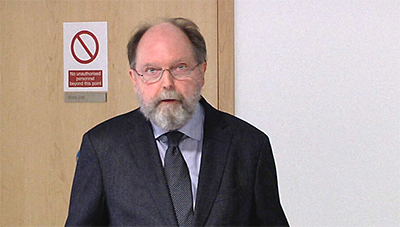Dr Michael Hagemeister - 4 November 2014 - The Protocols of the Elders of Zion: The Facts Surrounding a Fiction
Duration: 1 hour 10 mins
Share this media item:
Embed this media item:
Embed this media item:
About this item

| Description: |
A public talk by Dr Michael Hagemeister (Ruhr-Universität Bochum).
Investigations into the origin and early history of the “Protocols of the Elders of Zion” often lead to the border between fiction (or mystification) and historical fact. Furthermore, one can observe how this border is crossed: the “Protocols” were compiled from a series of fictional texts and then presented as the authentic document of an actual conspiracy. However, the (scientific) literature about the “Protocols” also far too frequently ignores this border, when, for example, coherent and therefore convincing stories take precedence over well-researched histories. In this paper I shall present some results of my research on the “Protocols”. A close reading of the early Russian versions shows that the “Protocols” is an “open text” of undefined genre which can be (and has been) perceived not only as a document but also as a fictional text, a negative utopia depicting a future global, totalitarian welfare state. This was overlaid with an apocalyptical reading of the “Protocols” which was introduced by Sergei Nilus, the most prominent editor and commentator of this text. The excited response to the “Protocols” since the early 1920s called for a prompt investigation into its origin and the channels through which it had been disseminated. Thereupon a detailed and coherent narrative was created and later authorized by a legal court. This narrative is, in itself, a conspiracy story, a dubious construction based on equally dubious witnesses. Thus the response to the myth of the Jewish conspiracy has been a counter-myth, which is no less mysterious than the one it aims to oppose. |
|---|
| Created: | 2014-11-10 10:43 |
|---|---|
| Collection: | Conspiracy and Democracy |
| Publisher: | University of Cambridge |
| Copyright: | Glenn Jobson |
| Language: | eng (English) |
| Distribution: |
World
|
| Keywords: | CRASSH; Conspiracy and Democracy; Michael Hagemeister; |
| Explicit content: | No |
| Aspect Ratio: | 16:9 |
| Screencast: | No |
| Bumper: | UCS Default |
| Trailer: | UCS Default |
| Abstract: | A public talk by Dr Michael Hagemeister (Ruhr-Universität Bochum).
Investigations into the origin and early history of the “Protocols of the Elders of Zion” often lead to the border between fiction (or mystification) and historical fact. Furthermore, one can observe how this border is crossed: the “Protocols” were compiled from a series of fictional texts and then presented as the authentic document of an actual conspiracy. However, the (scientific) literature about the “Protocols” also far too frequently ignores this border, when, for example, coherent and therefore convincing stories take precedence over well-researched histories. In this paper I shall present some results of my research on the “Protocols”. A close reading of the early Russian versions shows that the “Protocols” is an “open text” of undefined genre which can be (and has been) perceived not only as a document but also as a fictional text, a negative utopia depicting a future global, totalitarian welfare state. This was overlaid with an apocalyptical reading of the “Protocols” which was introduced by Sergei Nilus, the most prominent editor and commentator of this text. The excited response to the “Protocols” since the early 1920s called for a prompt investigation into its origin and the channels through which it had been disseminated. Thereupon a detailed and coherent narrative was created and later authorized by a legal court. This narrative is, in itself, a conspiracy story, a dubious construction based on equally dubious witnesses. Thus the response to the myth of the Jewish conspiracy has been a counter-myth, which is no less mysterious than the one it aims to oppose. |
|---|---|
Available Formats
| Format | Quality | Bitrate | Size | |||
|---|---|---|---|---|---|---|
| MPEG-4 Video | 1280x720 | 3.02 Mbits/sec | 1.55 GB | View | Download | |
| MPEG-4 Video | 640x360 | 1.95 Mbits/sec | 1.00 GB | View | Download | |
| WebM | 1280x720 | 3.01 Mbits/sec | 1.55 GB | View | Download | |
| WebM | 640x360 | 788.89 kbits/sec | 404.46 MB | View | Download | |
| iPod Video | 480x270 | 524.01 kbits/sec | 268.66 MB | View | Download | |
| MP3 | 44100 Hz | 252.6 kbits/sec | 129.51 MB | Listen | Download | |
| Auto * | (Allows browser to choose a format it supports) | |||||

